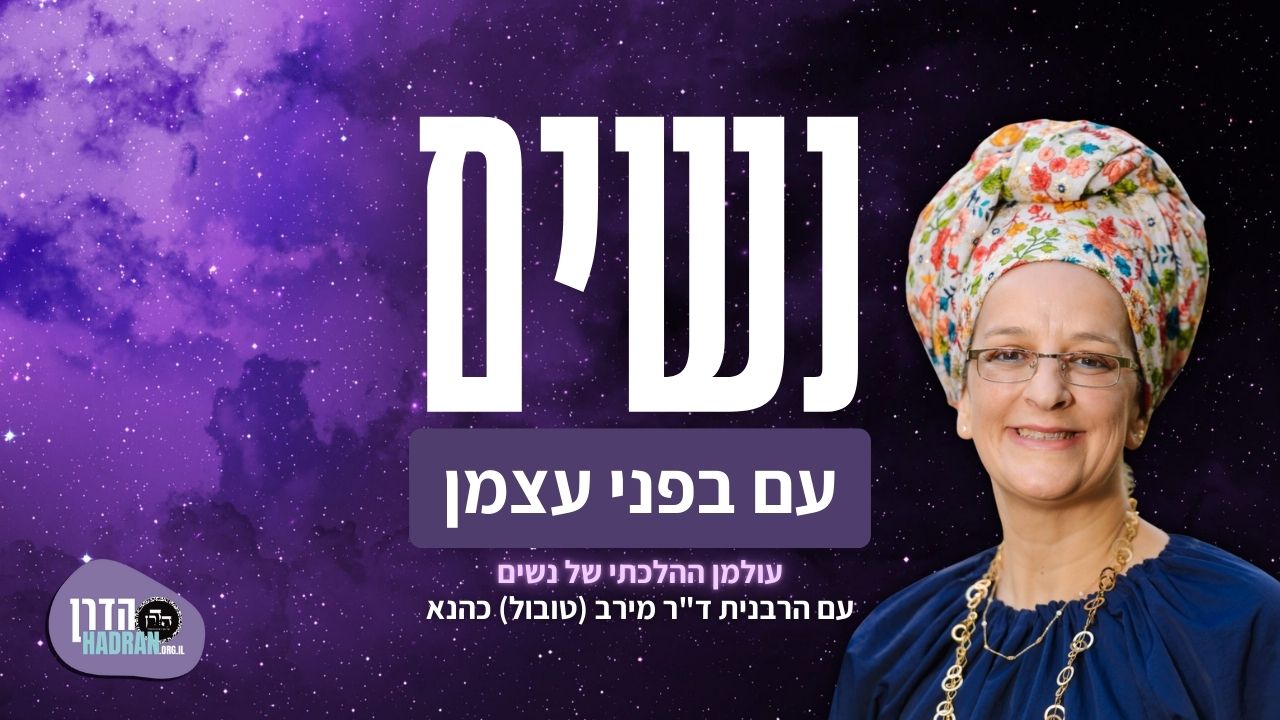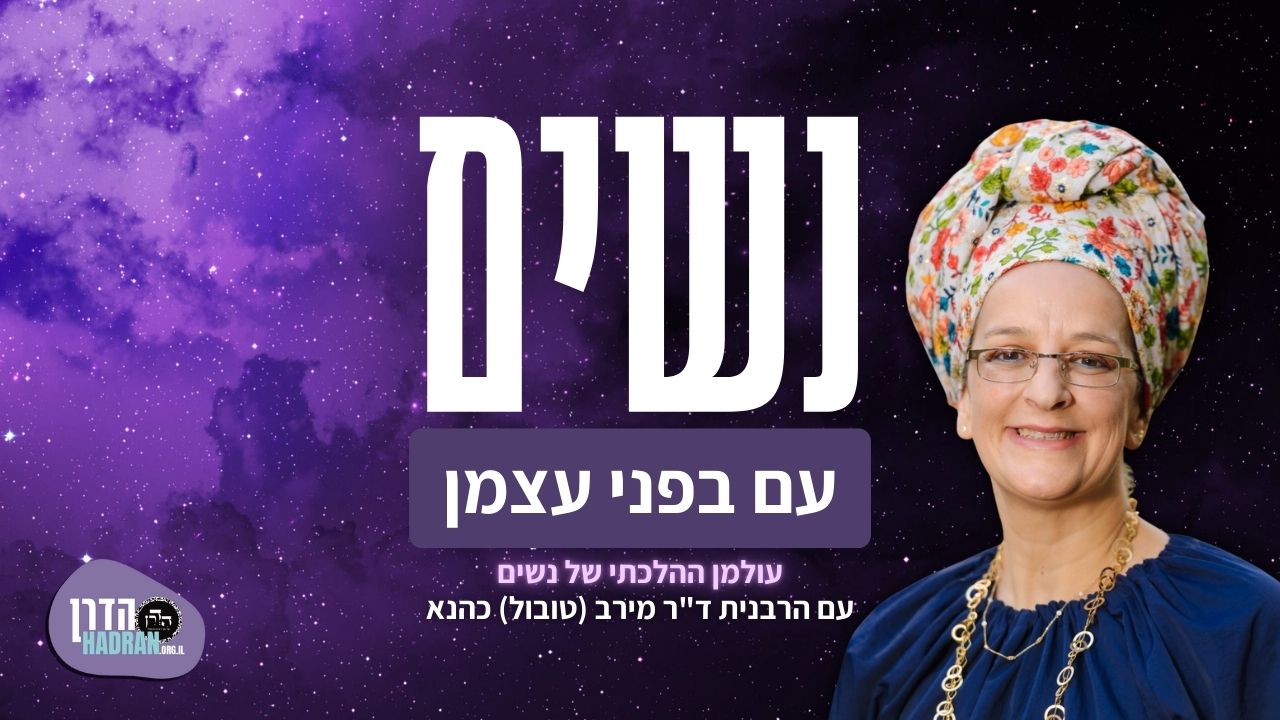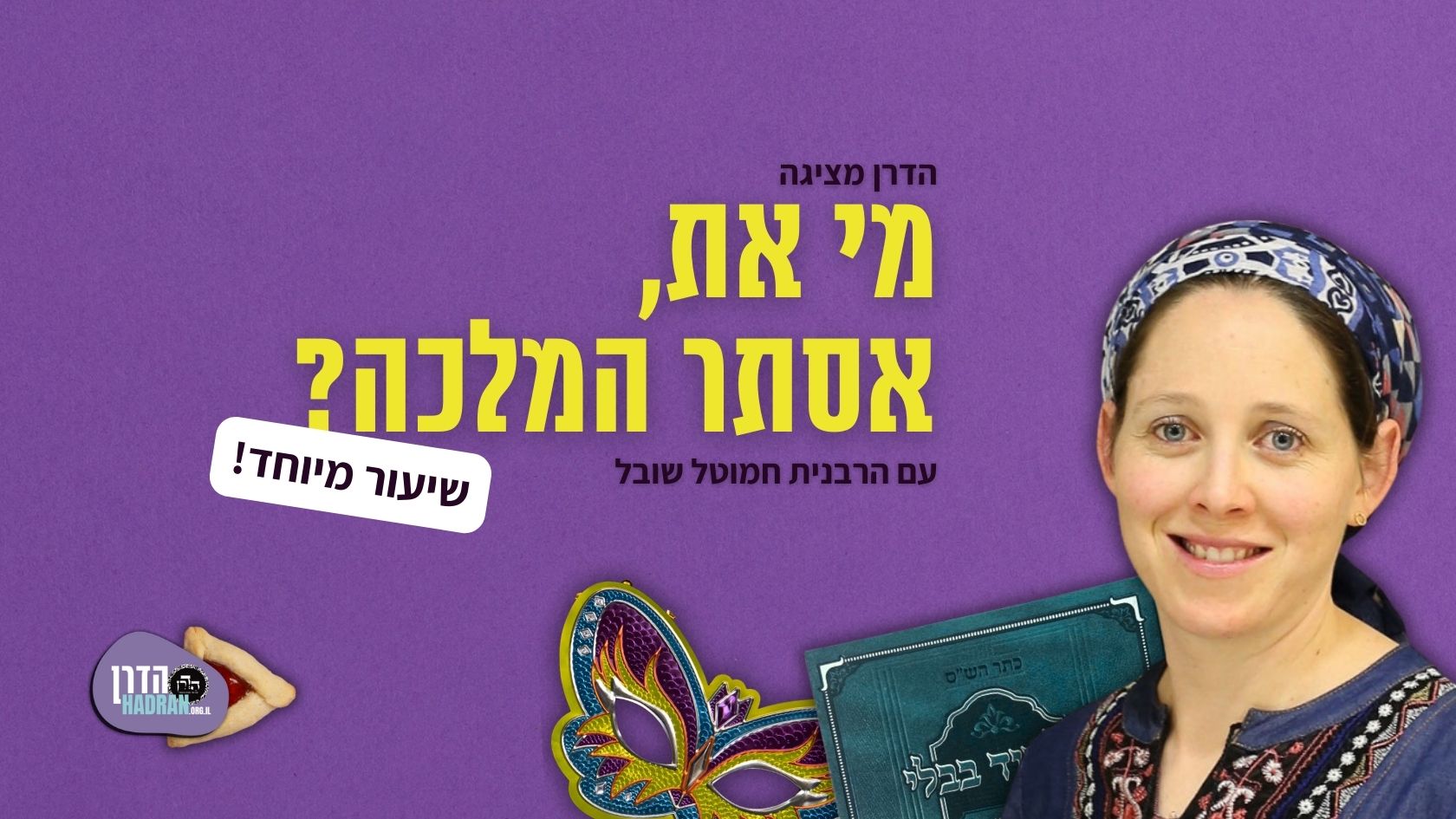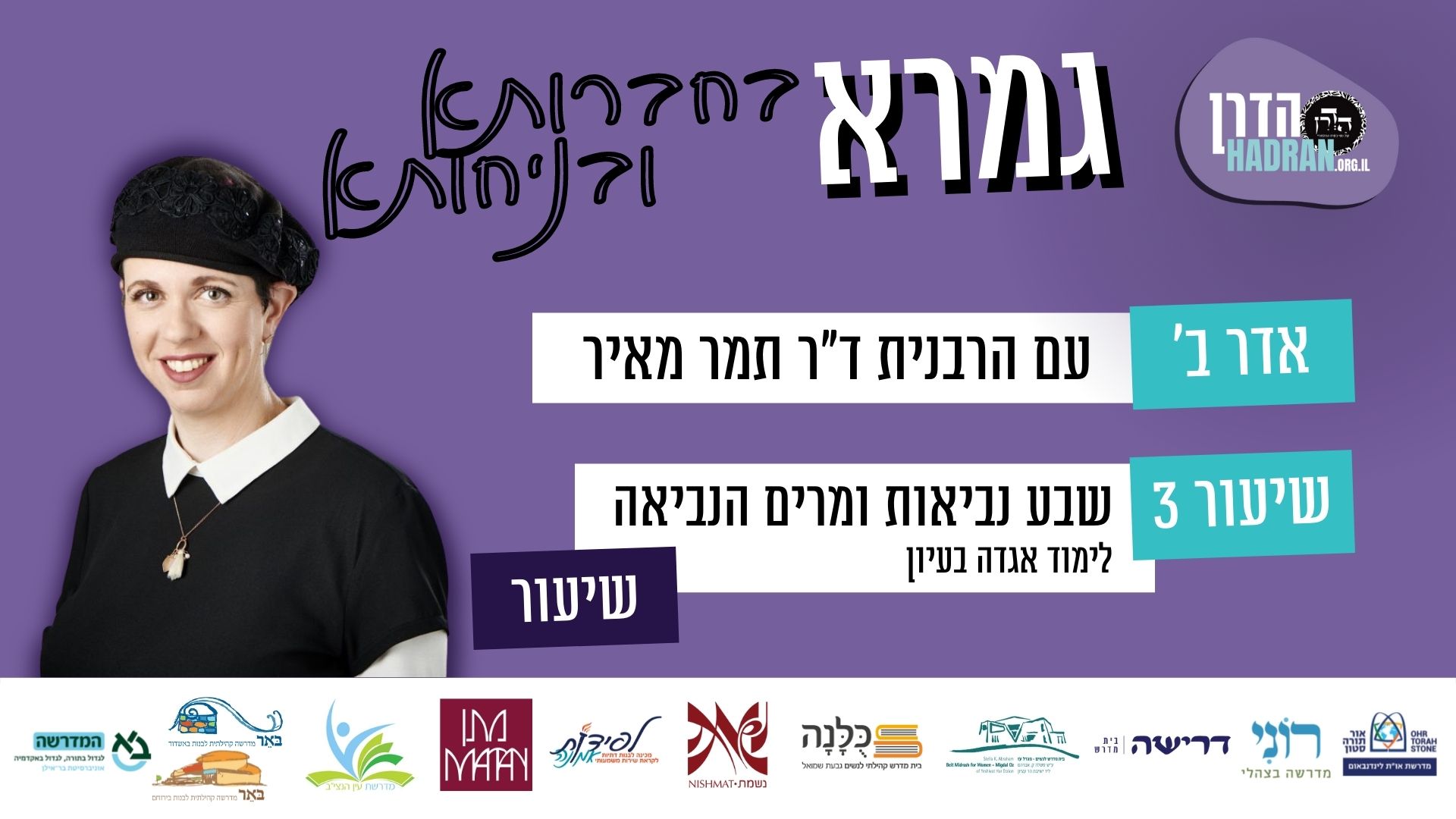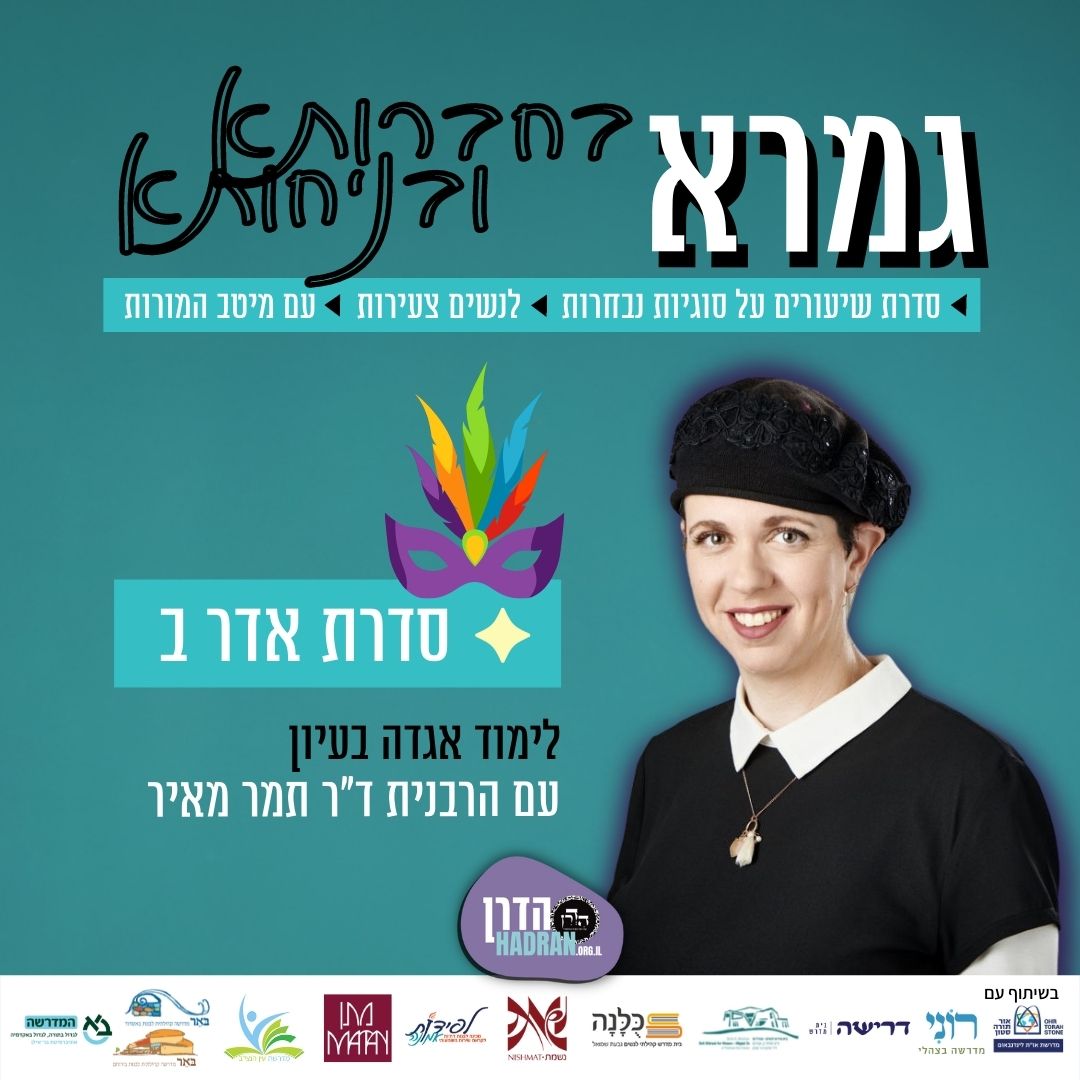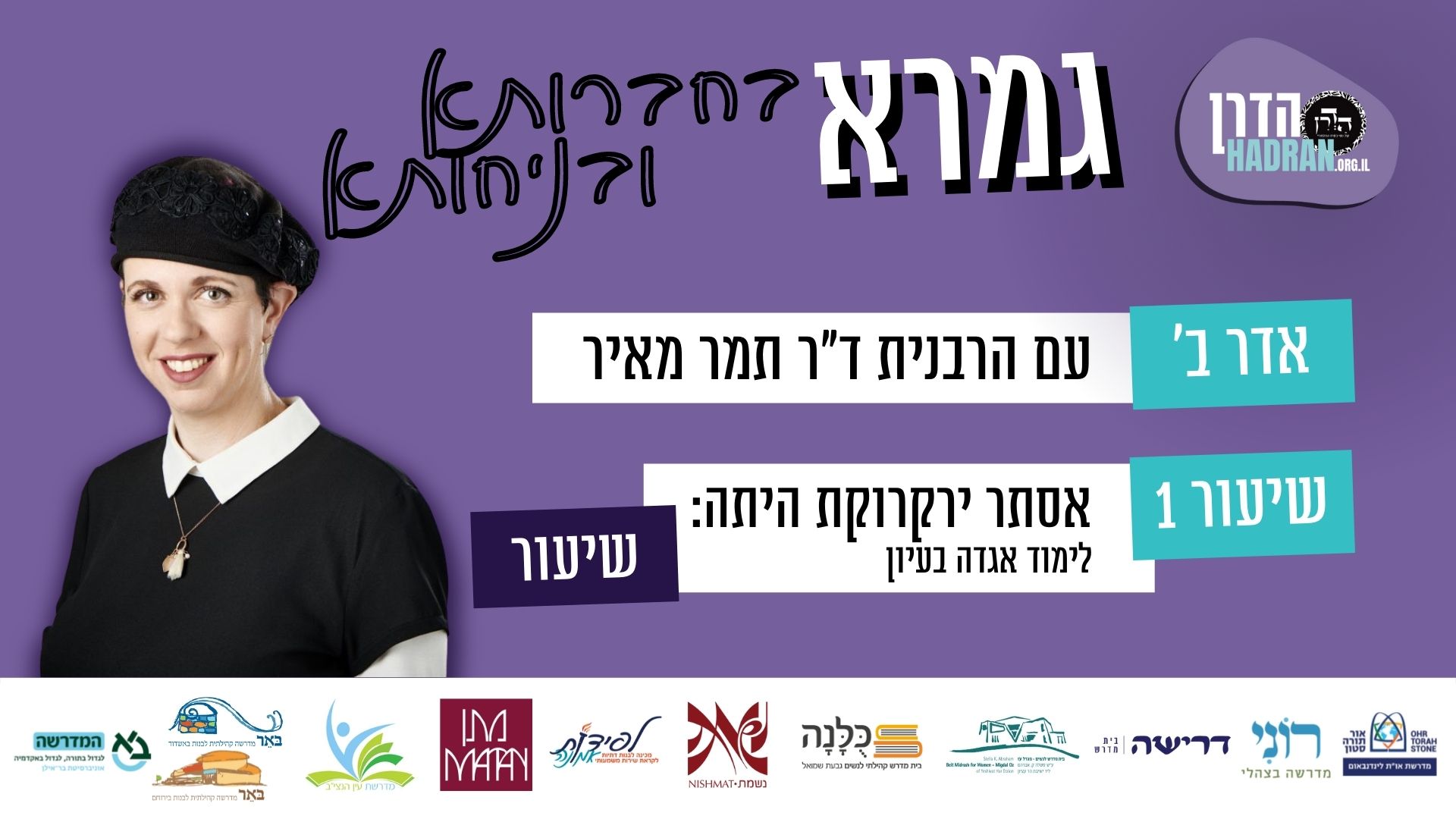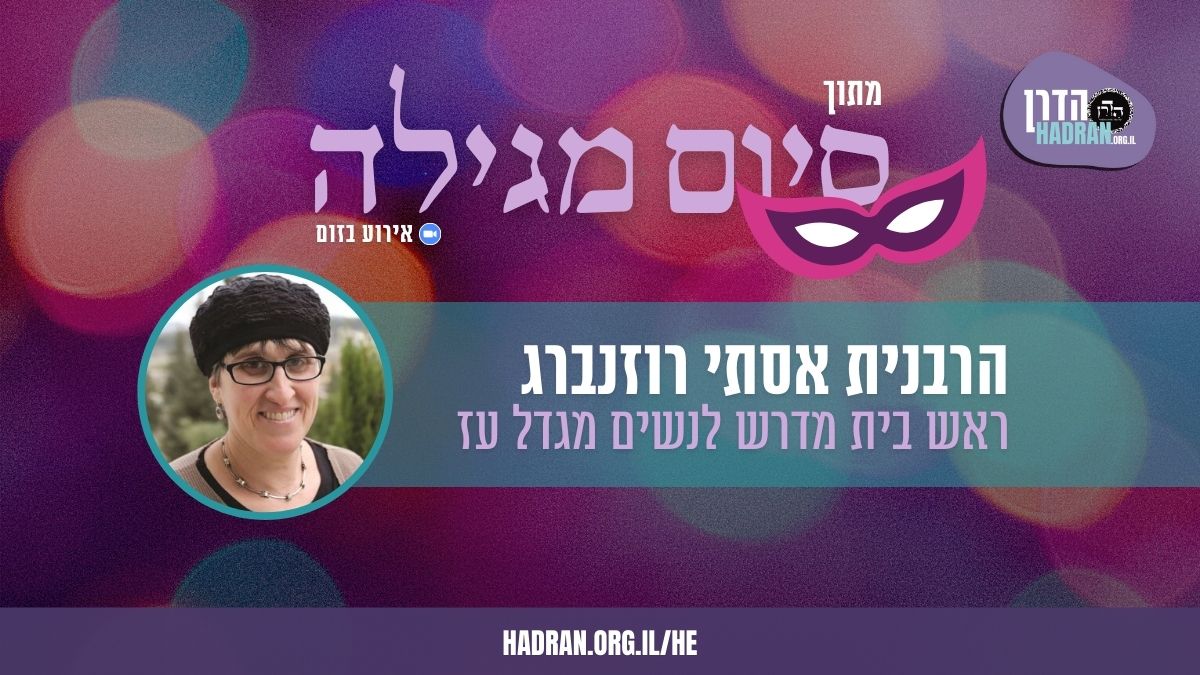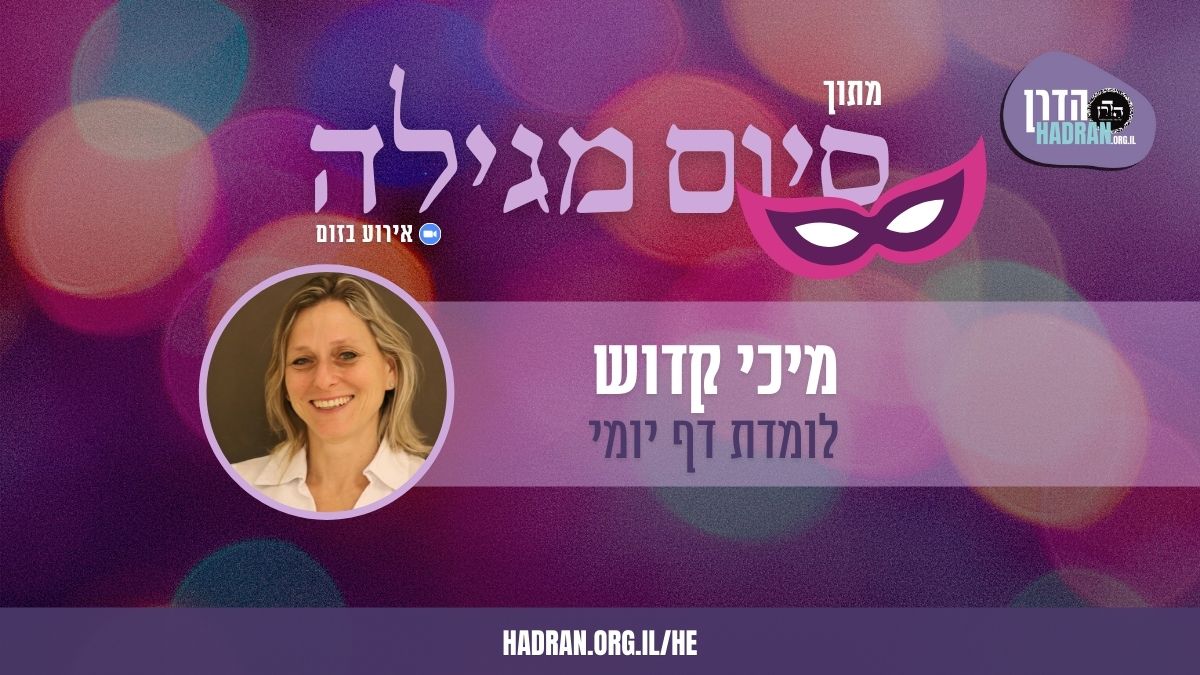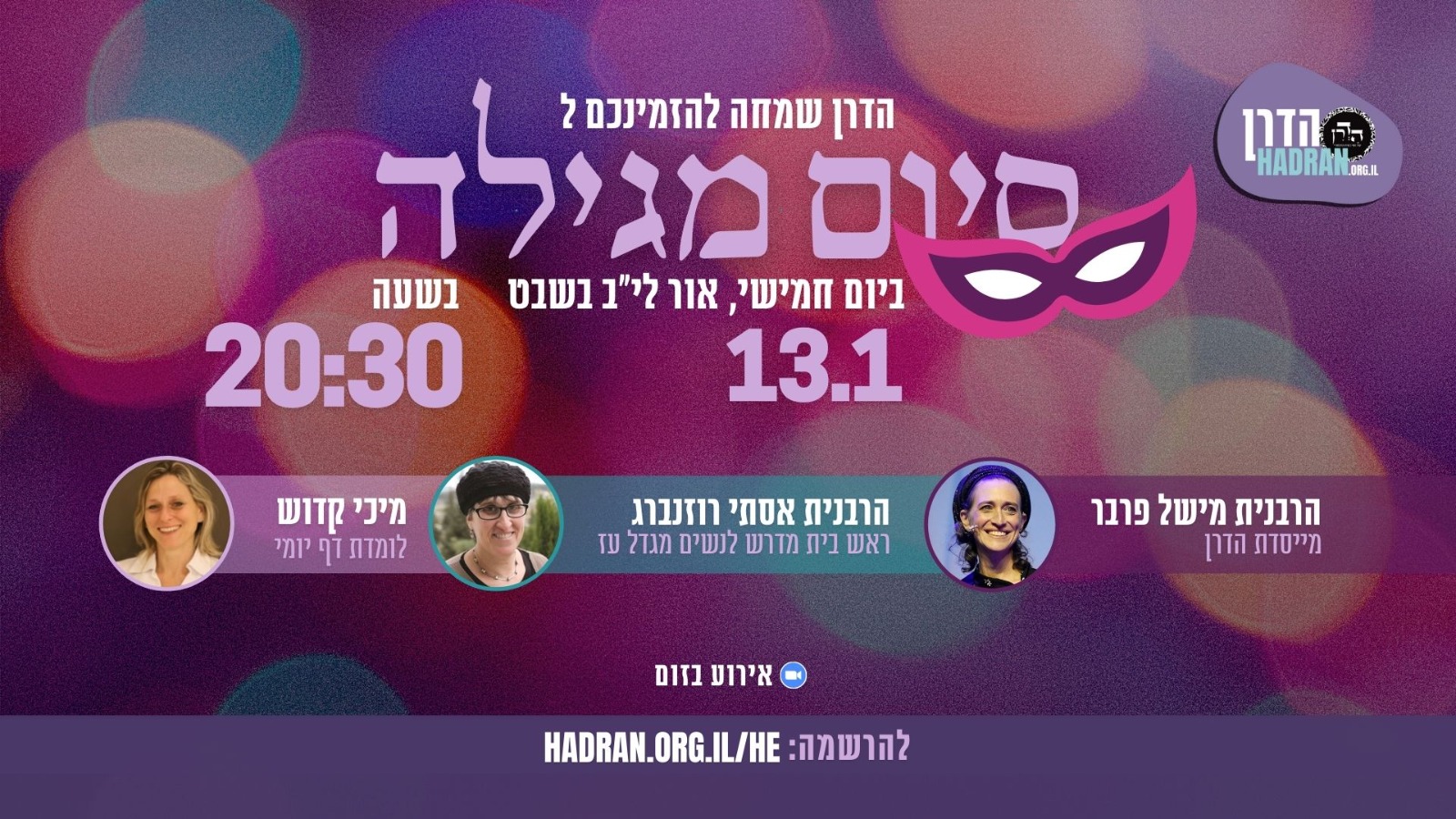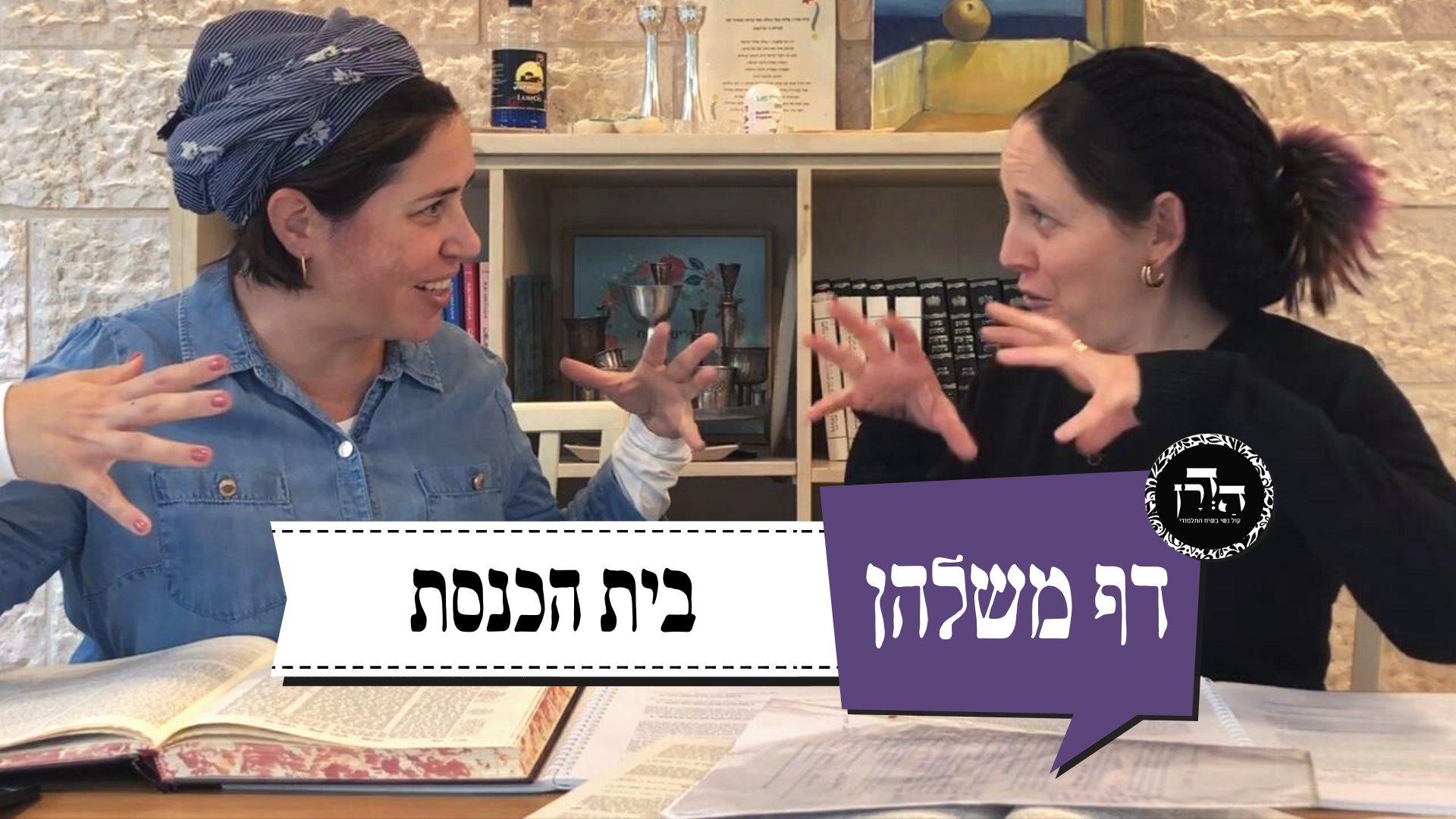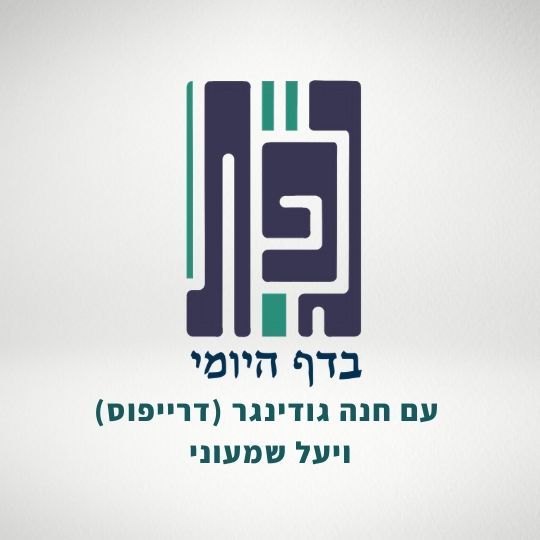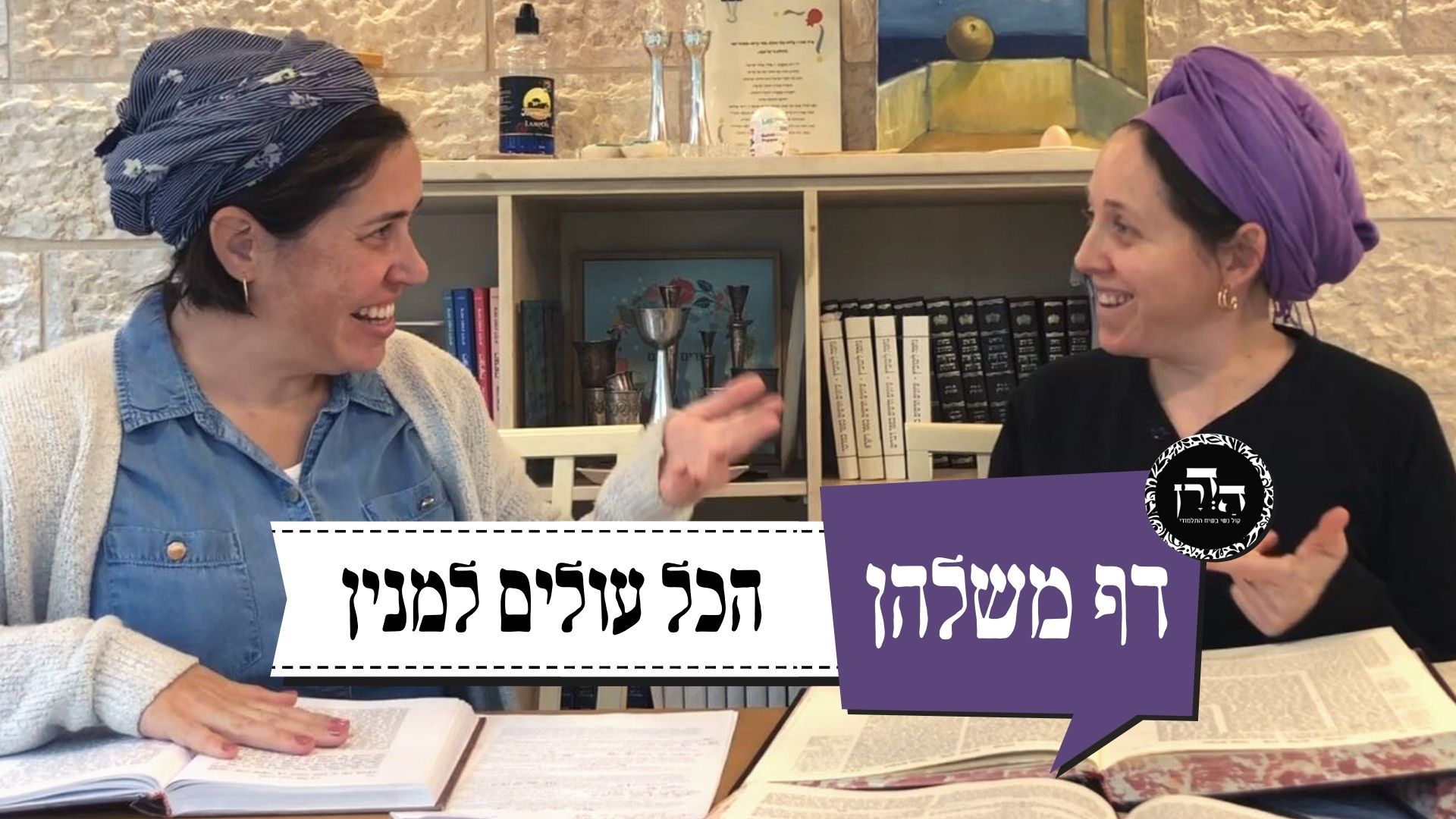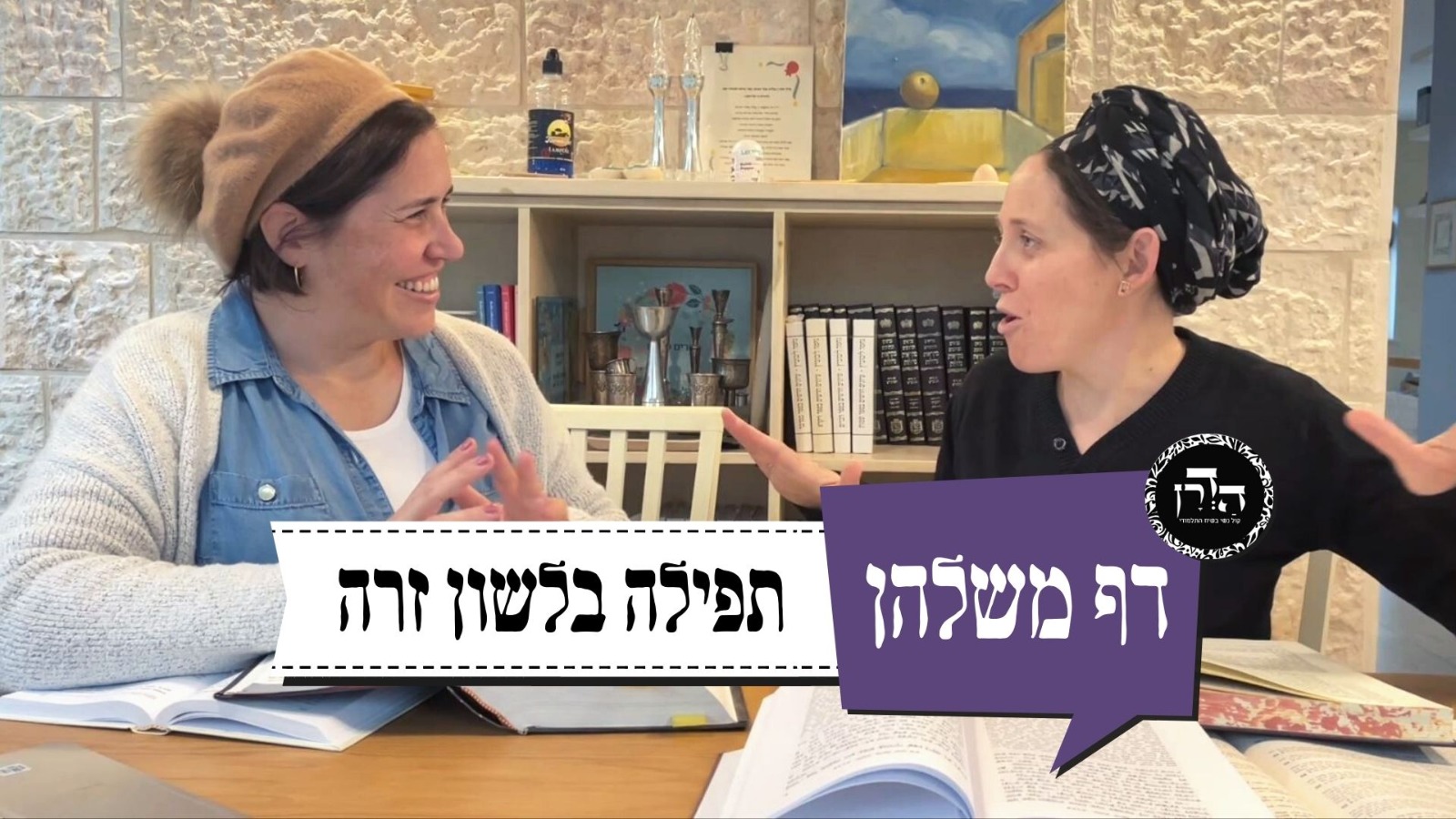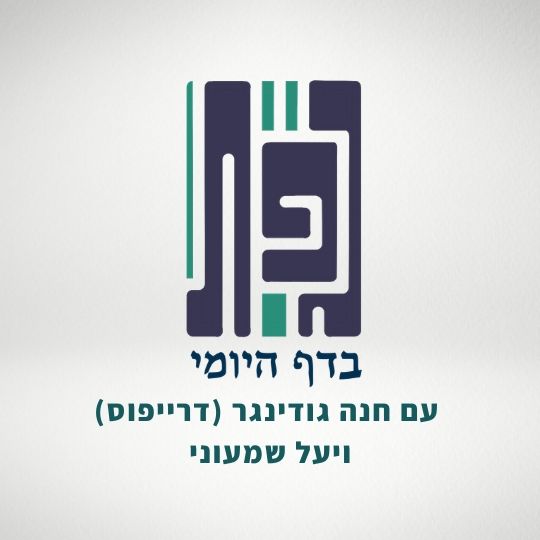איך מחלקים את הפסוקים של קריאת התורה לראש חודש לארבע עליות באופן שימנע בעיות כגון, השארת פחות משלושה פסוקים בקטע לעלייה הבאה. על מנת לענות על השאלה מביאה הגמרא ויכוח של רב ושמואל כיצד לחלק את קריאת התורה למעמדות. קושי בשתי הגישות מובא מברייתא עם ויכוח בין התנא קמא ל’יש אומרים’ על איך לחלק קטעים לעליות. עם זאת, המקרים אינם ברי השוואה. האם יותר שכיח שאנשים מאחרים לבית הכנסת ונכנסים באמצע קריאת התורה או שיוצאים מוקדם באמצע קריאת התורה? איזו רלוונטיות יש לשאלה הזו? המשנה לא הזכירה כמה עליות יש בתענית ציבור. האם זה שלוש כמו ימי שני וחמישי או ארבע כמו ראש חודש וחול המועד? מובאים מספר מקורות כדי לנסות לענות על שאלה זו, כולל מדיוקים ממשנתנו, אולם רובם נדחים. אחד המקורות התייחס למקרה שבו הגיע רב לבבל וקרא בתורה ובירך ברכה לפני ולא אחרי. גם בתפילת תחנון לא נפל על פניו. הגמרא מנסה להבין מדוע.
רוצה להקדיש שיעור?
כלים
העמקה
רוצה להבין מה באמת קורה מתחת לפני השטח של הסוגיה?
שיעורים, פודקאסטים והרחבות של מיטב המורות שלנו יפתחו לך עוד זוויות וכיווני חשיבה.
חדשה בלימוד הגמרא?
זה הדף הראשון שלך? איזו התרגשות עצומה! יש לנו בדיוק את התכנים והכלים שיעזרו לך לעשות את הצעדים הראשונים ללמידה בקצב וברמה שלך, כך תוכלי להרגיש בנוח גם בתוך הסוגיות המורכבות ומאתגרות.
פסיפס הלומדות שלנו
גלי את קהילת הלומדות שלנו, מגוון נשים, רקעים וסיפורים. כולן חלק מתנועה ומסע מרגש ועוצמתי.
מגילה כב
אֵין מַתְחִילִין בַּפָּרָשָׁה פָּחוֹת מִשְּׁלֹשָׁה פְּסוּקִים. לִיקְרֵי תְּרֵי מֵהָא וּתְלָתָא מֵהָךְ, פָּשׁוּ לְהוּ תְּרֵי!
one may not begin a new paragraph and read fewer than three verses from it. And if you say he should read two verses from this paragraph, i.e., the entire second paragraph, and then three verses from that final paragraph, only two verses will remain from the final paragraph. This is problematic because one may not conclude a reading with fewer than three verses left until the end of a paragraph and because the fourth reader will not have a sufficient number of verses to read.
אָמַר לוֹ: זוֹ לֹא שָׁמַעְתִּי, כַּיּוֹצֵא בָּהּ שָׁמַעְתִּי, דִּתְנַן: בַּיּוֹם הָרִאשׁוֹן — ״בְּרֵאשִׁית״ וִ״יְהִי רָקִיעַ״, וְתָנֵי עֲלַהּ: ״בְּרֵאשִׁית״ — בִּשְׁנַיִם, ״יְהִי רָקִיעַ״ — בְּאֶחָד.
Rava said to him: I have not heard a solution for this problem from my teachers. However, with regard to a similar problem I heard a solution from them, as we learned in a mishna (Ta’anit 26a): On Sunday, the non-priestly watches would read two paragraphs from the Torah: “In the beginning” (Genesis 1:1–5) and “Let there be a firmament” (Genesis 1:6–8). And it is taught in that regard that the paragraph “In the beginning” was read by two readers and the paragraph “Let there be a firmament” by one reader.
וְהָוֵינַן בַּהּ: בִּשְׁלָמָא ״יְהִי רָקִיעַ״ בְּאֶחָד, דִּתְלָתָא פְּסוּקֵי הָווּ, אֶלָּא ״בְּרֵאשִׁית״ בִּשְׁנַיִם? חַמְשָׁה פְּסוּקֵי הָווּ, וְתַנְיָא: הַקּוֹרֵא בַּתּוֹרָה לֹא יִפְחוֹת מִשְּׁלֹשָׁה פְּסוּקִים!
And we discussed this ruling and raised difficulties with it: Granted, the paragraph “Let there be a firmament” was read by one reader, as it consists of three verses. But how was the paragraph “In the beginning” read by two? It consists of only five verses, and it was taught in a mishna (23b): One who reads from the Torah should not read fewer than three verses.
וְאִיתְּמַר עֲלַהּ, רַב אָמַר: דּוֹלֵג. וּשְׁמוּאֵל אָמַר: פּוֹסֵק.
And it was stated with regard to that mishna that the amora’im disagreed about how to divide the verses. Rav said: The second reader repeats the last verse that the first reader had recited, so that each of them reads three verses. And Shmuel said: The first reader divides the third verse and reads half of it, and the second reader begins with the second half of that verse, as though each half were its own verse.
רַב אָמַר דּוֹלֵג, מַאי טַעְמָא לָא אָמַר פּוֹסֵק? קָסָבַר: כֹּל פְּסוּקָא דְּלָא פַּסְקֵיהּ מֹשֶׁה — אֲנַן לָא פָּסְקִינַן לֵיהּ.
The Gemara explains the opinions of Rav and Shmuel. Rav said that the second reader repeats the last verse that the first reader recited. What is the reason that he did not state that the first reader divides the third verse, in accordance with the opinion of Shmuel? The Gemara answers: He holds that any verse that Moses did not divide, we may not divide.
וּשְׁמוּאֵל אָמַר פָּסְקִינַן לֵיהּ? וְהָא אָמַר רַבִּי חֲנַנְיָא קָרָא: צַעַר גָּדוֹל הָיָה לִי אֵצֶל רַבִּי חֲנִינָא הַגָּדוֹל, וְלֹא הִתִּיר לִי לִפְסוֹק אֶלָּא לְתִינוֹקוֹת שֶׁל בֵּית רַבָּן, הוֹאִיל וּלְהִתְלַמֵּד עֲשׂוּיִין.
The Gemara asks: Does Shmuel say that we may divide a verse into two parts? Didn’t Rabbi Ḥananya Kara, the Bible expert, say: I had great distress with Rabbi Ḥanina the Great; there were many times I had to ask his permission to divide a verse, and he permitted me to divide it only for the benefit of schoolchildren, since they need to be taught in this manner, as it is difficult for children to learn long verses all at once? In other cases, however it is prohibited to divide a verse.
הָתָם טַעְמָא מַאי — מִשּׁוּם דְּלָא אֶפְשָׁר, הָכָא נָמֵי לָא אֶפְשָׁר.
The Gemara answers: There, in the case of schoolchildren, what is the reason that it is permitted to divide a verse? Because it is not possible to teach the children without doing so. Here, too, when a paragraph of five verses must be divided between two readers, it is not possible to divide them without dividing the middle verse.
וּשְׁמוּאֵל אָמַר פּוֹסֵק, מַאי טַעְמָא לָא אָמַר דּוֹלֵג? גְּזֵירָה מִשּׁוּם הַנִּכְנָסִין וּמִשּׁוּם הַיּוֹצְאִין.
The Gemara now examines the opinion of Shmuel. And Shmuel said: The first reader divides the third verse and reads half of it. The Gemara asks: What is the reason that he did not state that the second reader repeats the last verse recited by the first reader, in accordance with the opinion of Rav? The Gemara answers: It is because of a rabbinic decree that was instituted due to those who enter and those who leave the synagogue between the readings. These individuals might erroneously conclude that since the reading they heard consisted of three verses, the reading they missed consisted of only two verses. Therefore, the middle verse is divided into two parts, so that all will realize that no reader recites only two verses.
מֵיתִיבִי: פָּרָשָׁה שֶׁל שִׁשָּׁה פְּסוּקִים קוֹרִין אוֹתָהּ בִּשְׁנַיִם, וְשֶׁל חֲמִשָּׁה פְּסוּקִים בְּיָחִיד. קָרָא רִאשׁוֹן שְׁלֹשָׁה — הַשֵּׁנִי קוֹרֵא שְׁנַיִם מִפָּרָשָׁה זוֹ וְאֶחָד מִפָּרָשָׁה אַחֶרֶת. וְיֵשׁ אוֹמְרִים שְׁלֹשָׁה, לְפִי שֶׁאֵין מַתְחִילִין בַּפָּרָשָׁה פָּחוֹת מִשְּׁלֹשָׁה פְּסוּקִים.
The Gemara raises an objection to the opinions of Rav and Shmuel from the following baraita: Two people may read a paragraph of six verses, but a paragraph of five verses may be read only by a single reader. If the first one read three verses, the second one reads the remaining two verses from this paragraph and then one verse from another, i.e., the following, paragraph. And some say that it does not suffice to read one verse from the next paragraph; rather, he must read three verses, as one may not begin a new paragraph and read fewer than three verses from it.
וְאִם אִיתָא, לְמַאן דְּאָמַר דּוֹלֵג — נִדְלוֹג, וּלְמַאן דְּאָמַר פּוֹסֵק — נִפְסוֹק!
And if it is so, if it is permissible to do as Rav and Shmuel suggested, according to the one who said that the second reader repeats a verse that the previous reader recited, i.e., Rav, let him repeat the verse in this case as well. And according to the one who said that the second reader divides the verse, i.e., Shmuel, let him divide the verse in this case as well.
שָׁאנֵי הָתָם, דְּאֶפְשָׁר בְּהָכִי.
The Gemara answers: There, in the case of the baraita, it is different, as it is possible to solve the problem in this manner by reading additional verses. On the New Moon, however, the next paragraph deals with an entirely different subject, and consequently it cannot be included in the Torah reading. Therefore, Rav and Shmuel presented alternate solutions.
אָמַר רַבִּי תַּנְחוּם אָמַר רַבִּי יְהוֹשֻׁעַ בֶּן לֵוִי: הֲלָכָה כְּיֵשׁ אוֹמְרִים, וְאָמַר רַבִּי תַּנְחוּם אָמַר רַבִּי יְהוֹשֻׁעַ בֶּן לֵוִי: כְּשֵׁם שֶׁאֵין מַתְחִילִין בַּפָּרָשָׁה פָּחוֹת מִשְּׁלֹשָׁה פְּסוּקִים, כָּךְ אֵין מְשַׁיְּירִין בַּפָּרָשָׁה פָּחוֹת מִשְּׁלֹשָׁה פְּסוּקִים.
With regard to the dispute cited in the baraita, Rabbi Tanḥum said that Rabbi Yehoshua ben Levi said: The halakha is in accordance with the opinion introduced by the phrase: Some say, which maintains that at least three verses must be read from the next paragraph. And furthermore, Rabbi Tanḥum said that Rabbi Yehoshua ben Levi said: Just as one may not begin a new paragraph and read fewer than three verses from it, so too, one may not leave fewer than three verses before the end of a paragraph at the conclusion of a reading.
פְּשִׁיטָא! הַשְׁתָּא וּמָה אַתְחַלְתָּא, דְּקָא מַקֵּיל תַּנָּא קַמָּא — מַחְמְירִי יֵשׁ אוֹמְרִים, שִׁיּוּר, דְּמַחְמִיר תַּנָּא קַמָּא — לֹא כׇּל שֶׁכֵּן דְּמַחְמְירִי יֵשׁ אוֹמְרִים?!
The Gemara challenges this statement: This is obvious. Now, if with regard to the beginning of a paragraph, where the first tanna is lenient and holds that it is sufficient to read one verse from the next paragraph, the opinion introduced with the phrase: Some say, is stringent, then with regard to leaving verses at the end of a paragraph, where even the first tanna is stringent and holds that one may not conclude a reading with fewer than three verses remaining until the end of a paragraph, is it not all the more so obvious that the opinion introduced with: Some say, is stringent?
מַהוּ דְּתֵימָא: נִכְנָסִין שְׁכִיחִי, יוֹצְאִין לָא שְׁכִיחִי, דְּמַנְּחִי סֵפֶר תּוֹרָה וְנָפְקִי, קָא מַשְׁמַע לַן.
The Gemara answers: Lest you say: Entering in the middle of the Torah reading is common, and therefore one should not conclude a reading after having read fewer than three verses of a paragraph, but leaving in the middle of the Torah reading, whereby one abandons a Torah scroll and leaves, is not common, and therefore one may conclude a reading with fewer than three verses left in the paragraph, Rabbi Yehoshua ben Levi teaches us that the second opinion cited in the baraita is also concerned that people may leave in the middle of the Torah reading, and consequently one may not conclude a reading with fewer than three verses left in the paragraph.
וְתַנָּא קַמָּא מַאי שְׁנָא שַׁיּוֹרֵי דְּלָא — מִשּׁוּם יוֹצְאִין, אַתְחוֹלֵי נָמֵי, גְּזֵירָה מִשּׁוּם הַנִּכְנָסִין? אָמְרִי: מַאן דְּעָיֵיל שַׁיּוֹלֵי [מְ]שַׁיֵּיל.
The Gemara asks: And according to the first tanna, what is different about leaving fewer than three verses at the end of a paragraph, which is not permitted due to concern about those who leave the synagogue in the middle of the Torah reading? In the case of beginning a paragraph without reading at least three verses, he should also hold that there is a rabbinic decree due to those who enter, lest the latecomer think that the previous reader read fewer than three verses. The Gemara responds: Say in answer to this question that one who enters in the middle of the Torah reading asks how the Torah was read until then, and those present will explain to him that the reader started in the previous paragraph. Therefore, he will not erroneously think that the reader recited fewer than three verses.
שְׁלַח לֵיהּ רַבָּה בְּרֵיהּ דְּרָבָא לְרַב יוֹסֵף: הִלְכְתָא מַאי? שְׁלַח לֵיהּ, הִלְכְתָא: דּוֹלֵג, וְאֶמְצָעִי דּוֹלְגָן.
Rabba, son of Rava, sent a messenger to ask Rav Yosef: What is the halakha with regard to dividing a small Torah portion? Rav Yosef sent him the following answer: The halakha is that one repeats a verse, in accordance with the opinion of Rav, and it is the middle reader who repeats it, and not the last reader, so that it will not be necessary to leave fewer than three verses until the end of the paragraph.
זֶה הַכְּלָל, כֹּל שֶׁיֵּשׁ בּוֹ מוּסָף וְכוּ׳. אִיבַּעְיָא לְהוּ: תַּעֲנִית צִבּוּר בְּכַמָּה? רֹאשׁ חֹדֶשׁ וּמוֹעֵד דְּאִיכָּא קׇרְבַּן מוּסַף — אַרְבָּעָה, אֲבָל הָכָא דְּלֵיכָּא קׇרְבַּן מוּסַף — לָא. אוֹ דִלְמָא: הָכָא נָמֵי אִיכָּא מוּסַף תְּפִלָּה.
§ We learned in the mishna: This is the principle: Any day on which there is an additional offering sacrificed in the Temple and that is not a Festival, four people read from the Torah. A dilemma was raised before the Sages: On a public fast, how many people read from the Torah? Does the mishna mean to say that only on the New Moon and the intermediate days of a Festival, when there is an additional offering, four people read; but here, on a public fast day, when there is no additional offering, no, only three people read? Or perhaps here, too, there is an additional prayer, as on public fast days the prayer: Aneinu, is inserted into the Amida prayer, and so too an additional reader is called to read from the Torah.
תָּא שְׁמַע: בְּרָאשֵׁי חֳדָשִׁים וּבְחוּלּוֹ שֶׁל מוֹעֵד קוֹרִין אַרְבָּעָה, הָא בְּתַעֲנִית צִבּוּר שְׁלֹשָׁה! אֵימָא רֵישָׁא: בְּשֵׁנִי וּבַחֲמִישִׁי וּבַשַּׁבָּת בַּמִּנְחָה קוֹרִין שְׁלֹשָׁה: הָא תַּעֲנִית צִבּוּר אַרְבָּעָה! אֶלָּא מֵהָא לֵיכָּא לְמִישְׁמַע מִינַּהּ.
The Gemara attempts to adduce a proof: Come and hear that which we learned in the mishna: On the days of the New Moon and on the intermediate days of a Festival, four people read from the Torah. Doesn’t this indicate that on a public fast, only three people read? The Gemara responds: Say the first clause of the mishna: On Mondays and Thursdays during the morning service and on Shabbat during the afternoon service, three people read from the Torah. Doesn’t this indicate that on a public fast, four people read from the Torah? Rather, it must be concluded that nothing can be derived from this mishna with regard to a public fast day, as the mishna does not mean to indicate the halakha in every possible case.
תָּא שְׁמַע: דְּרַב אִיקְּלַע לְבָבֶל בְּתַעֲנִית צִבּוּר, קָם קְרָא בְּסִיפְרָא. פְּתַח בָּרֵיךְ, חֲתַים וְלָא בָּרֵיךְ. נְפוּל כּוּלֵּי עָלְמָא אַאַנְפַּיְיהוּ, וְרַב לָא נְפַל עַל אַפֵּיהּ.
A different proof is now suggested. Come and hear the following incident: Rav once happened to come to Babylonia on a public fast. He stood and read from a Torah scroll. When he began to read, he recited a blessing, but when he concluded, he did not recite a blessing. Everyone else fell on their faces, i.e., bowed down on the floor, during the Taḥanun supplication, as was the custom, but Rav did not fall on his face.
מִכְּדֵי רַב בְּיִשְׂרָאֵל קְרָא, מַאי טַעְמָא חֲתַם וְלָא בָּרֵיךְ? לָאו מִשּׁוּם דְּבָעֵי לְמִיקְרֵי אַחֲרִינָא בָּתְרֵיהּ?
The Gemara attempts to clarify the halakha based upon Rav’s conduct. Now, Rav must have read the portion that is designated for an Israelite, as he was neither a priest nor a Levite, and therefore he was the third person to read from the Torah. What, then, is the reason that when he concluded his reading he did not recite a blessing? Was it not because another person was to read after him, and since only the last reader recites a blessing, Rav did not recite a blessing upon completion of his portion? This would indicate that four readers are called to the Torah on public fasts.
לָא, רַב בְּכָהֲנֵי קְרָא. דְּהָא רַב הוּנָא קָרֵי בְּכָהֲנֵי.
The Gemara rejects this proof: No, Rav read the first reading, which is generally designated for priests. He was the leading Torah authority of his generation, and one who holds this position is called to read from the Torah even before a priest, as Rav Huna would read the first reading, which is generally designated for priests, and Rav would do the same.
בִּשְׁלָמָא רַב הוּנָא קָרֵי בְּכָהֲנֵי, דְּהָא אֲפִילּוּ רַב אַמֵּי וְרַב אַסִּי דְּכָהֲנֵי חֲשִׁיבִי דְּאַרְעָא יִשְׂרָאֵל, מִיכָּף כַּיְיפִי לֵיהּ לְרַב הוּנָא. אֶלָּא רַב — הָא אִיכָּא שְׁמוּאֵל, דְּכָהֲנָא הֲוָה, וְדָבַר עֲלֵיהּ!
The Gemara raises a difficulty: Granted, Rav Huna read the portion designated for priests, as even Rav Ami and Rav Asi, who were the most esteemed priests in Eretz Yisrael, were subordinate to Rav Huna, and he was considered the undisputed rabbinic leader of the Jewish people. However, in the case of Rav, there was Shmuel, who was a priest, and Rav had elevated him above himself, showing Shmuel deference in all matters of honor. Consequently, Rav was not the singular leader of his generation and would not have read the first reading in place of a priest.
שְׁמוּאֵל נָמֵי מִיכָּף הֲוָה כַּיִיף לֵיהּ לְרַב, וְרַב הוּא דַּעֲבַד לֵיהּ כָּבוֹד, וְכִי עָבֵיד לֵיהּ — בְּפָנָיו, שֶׁלֹּא בְּפָנָיו — לָא עָבֵיד לֵיהּ.
The Gemara answers: In fact, Shmuel was also subordinate to Rav, as Rav was indeed the leading authority in Babylonia, and it was Rav who showed Shmuel honor of his own volition, in order to appease him for having cursed him. And he did this only when Shmuel was in his presence, but when he was not in his presence, Rav did not do this, and therefore Rav would read first from the Torah when Shmuel was not present.
הָכִי נָמֵי מִסְתַּבְּרָא דְּרַב בְּכָהֲנֵי קְרָא, דְּאִי סָלְקָא דַעְתָּךְ בְּיִשְׂרָאֵל קְרָא, לְפָנֶיהָ מַאי טַעְמָא בָּרֵיךְ! לְאַחַר תַּקָּנָה.
The Gemara comments: So too, it is reasonable to assume that Rav read first from the portion that is generally designated for priests, because if it enters your mind to say that he read third, from the portion designated for an ordinary Israelite, what is the reason he recited a blessing before reading his portion? Only the first reader recites a blessing before reading from the Torah. The Gemara rejects this argument: This incident took place after it was instituted that all those called to read from the Torah recite a blessing.
אִי הָכִי, לְאַחֲרֶיהָ נָמֵי לְבָרֵיךְ! שָׁאנֵי הֵיכָא דְּיָתֵיב רַב — דְּמֵיעָל עָיְילִי,
The Gemara asks: If so, he should also have recited a blessing after his reading, as the rabbinic enactment requires those who read from the Torah to recite blessings both before and after their reading. The Gemara answers: The reason that the Sages required all the readers to recite blessings both before and after their readings was to prevent misunderstandings on the part of both those who enter the synagogue in the middle of the reading and those who leave early. But it was different where Rav was present, as people would enter the synagogue in the middle of the reading,
מִיפָּק לָא נָפְקִי.
but they would not leave early, out of deference to Rav, and therefore it was not necessary for him to recite a blessing after he finished his portion. In any event, the incident with Rav does not provide conclusive proof as to the number of readers on a public fast day.
תָּא שְׁמַע, זֶה הַכְּלָל: כֹּל שֶׁיֵּשׁ בּוֹ בִּיטּוּל מְלָאכָה לָעָם, כְּגוֹן תַּעֲנִית צִבּוּר וְתִשְׁעָה בְּאָב — קוֹרִין שְׁלֹשָׁה,
The Gemara tries to adduce another proof: Come and hear the following baraita: This is the general principle: Any day on which labor is permitted and prolonging the prayer service would constitute a deprivation of labor for the masses, for example, a public fast day and the Ninth of Av, only three people read from the Torah, so as not to lengthen the prayer service unnecessarily.
וְשֶׁאֵין בּוֹ בִּיטּוּל מְלָאכָה לָעָם, כְּגוֹן רָאשֵׁי חֳדָשִׁים וְחוּלּוֹ שֶׁל מוֹעֵד — קוֹרִין אַרְבָּעָה. שְׁמַע מִינַּהּ.
But any day on which prolonging the prayer service would not constitute a deprivation of labor for the masses, for example, the days of the New Moon, when it is customary for women to refrain from work, and on the intermediate days of a Festival, when one may not perform labor unless refraining from labor will cause him to lose money, four people read from the Torah. The Gemara concludes: Indeed, learn from here that on a public fast day three people read from the Torah.
אָמַר רַב אָשֵׁי, וְהָא אֲנַן לָא תְּנַן הָכִי: זֶה הַכְּלָל, כׇּל יוֹם שֶׁיֵּשׁ בּוֹ מוּסָף וְאֵינוֹ יוֹם טוֹב — קוֹרִין אַרְבָּעָה. לְאֵתוֹיֵי מַאי? לָאו לְאֵתוֹיֵי תַּעֲנִית צִיבּוּר וְתִשְׁעָה בְּאָב!
Rav Ashi said: Didn’t we learn in the mishna as follows: This is the principle: Any day on which there is an additional offering sacrificed in the Temple and it is not a Festival, four people read from the Torah? What is added by the formulation of this principle? Does it not come to add a public fast and the Ninth of Av, when there is an addition to the prayer service, and therefore four people read from the Torah?
וּלְרַב אָשֵׁי מַתְנִיתִין מַנִּי? לָא תַּנָּא קַמָּא וְלָא רַבִּי יוֹסֵי, דְּתַנְיָא: חָל לִהְיוֹת בְּשֵׁנִי וּבַחֲמִישִׁי — קוֹרִין שְׁלֹשָׁה וּמַפְטִיר אֶחָד. בִּשְׁלִישִׁי וּבִרְבִיעִי — קוֹרֵא אֶחָד וּמַפְטִיר אֶחָד. רַבִּי יוֹסֵי אוֹמֵר: לְעוֹלָם קוֹרִין שְׁלֹשָׁה וּמַפְטִיר אֶחָד!
The Gemara asks: But according to Rav Ashi, who is the tanna of the mishna? It is not the first tanna of the following baraita and not Rabbi Yosei. As it is taught in a baraita: If the Ninth of Av occurs on a Monday or a Thursday, days on which there is always a Torah reading, three people read from the Torah. And the last one of them concludes with a reading from the Prophets [haftara]. If it falls on a Tuesday or a Wednesday, one person reads from the Torah, and the same one concludes with a reading from the Prophets. Rabbi Yosei said: Three people always read from the Torah on the Ninth of Av, and the last one concludes with a reading from the Prophets. All agree that no more than three people read from the Torah on the Ninth of Av and other public fast days.
וְאֶלָּא, קַשְׁיָא ״זֶה הַכְּלָל״! לָא, לְאֵתוֹיֵי רֹאשׁ חוֹדֶשׁ וּמוֹעֵד.
The Gemara responds: However, if only three people read from the Torah on these days, the statement: This is the principle, is difficult, as the mishna has already specifically mentioned every case included in the principle. The Gemara explains: No, it is not difficult; it comes to add the New Moon and the intermediate days of a Festival.
הָא בְּהֶדְיָא קָתָנֵי לַהּ: בְּרָאשֵׁי חֳדָשִׁים וּמוֹעֵד קוֹרִין אַרְבָּעָה!
The Gemara challenges this explanation: Aren’t these days taught explicitly in the mishna: On the New Moon and on the intermediate days of a Festival, four people read from the Torah?
סִימָנָא בְּעָלְמָא יָהֵיב, דְּלָא תֵּימָא יוֹם טוֹב וְחוּלּוֹ שֶׁל מוֹעֵד כִּי הֲדָדֵי נִינְהוּ, אֶלָּא נְקוֹט הַאי כְּלָלָא בִּידָךְ: כֹּל דְּטָפֵי לֵיהּ מִילְּתָא מֵחַבְרֵיהּ, טָפֵי לֵיהּ גַּבְרָא יַתִּירָא.
The Gemara answers: The principle was not intended to add to what is stated explicitly in the mishna. The mishna merely gives a mnemonic by which to remember the number of readers on each day. It expresses the following: Do not say that a Festival and the intermediate days of the Festival are the same with regard to their sanctity, and therefore the same numbers of readers are called to the Torah on these days. Rather, hold this rule firmly in your hand: On any day when there is an additional element of the laws of the day, an extra person is added to the number of those who read from the Torah.
הִלְכָּךְ בְּרֹאשׁ חוֹדֶשׁ וּמוֹעֵד, דְּאִיכָּא קׇרְבַּן מוּסָף — קוֹרִין אַרְבָּעָה. בְּיוֹם טוֹב, דְּאָסוּר בַּעֲשִׂיַּית מְלָאכָה — חֲמִשָּׁה. בְּיוֹם הַכִּפּוּרִים, דְּעָנוּשׁ כָּרֵת — שִׁשָּׁה. שַׁבָּת, דְּאִיכָּא אִיסּוּר סְקִילָה — שִׁבְעָה.
Therefore, on the New Moon and the intermediate days of a Festival, when there is an additional offering, four people read from the Torah. On a Festival, when it is prohibited to perform labor, five people read from the Torah. On Yom Kippur, when performance of prohibited labor is punishable by karet, six people read from the Torah. On Shabbat, when there is a prohibition to perform labor that is punishable by stoning, seven people read.
גּוּפַהּ: רַב אִיקְּלַע לְבָבֶל בְּתַעֲנִית צִבּוּר, קָם קְרָא בְּסִפְרָא. פְּתַח בָּרֵיךְ, חֲתַם וְלָא בָּרֵיךְ. נְפוּל כּוּלֵּי עָלְמָא אַאַנְפַּיְיהוּ וְרַב לָא נְפַל עַל אַנְפֵּיהּ. מַאי טַעְמָא רַב לָא נְפַל עַל אַפֵּיהּ?
The Gemara cited an incident involving Rav, and now it returns to examine the matter itself. Rav once happened to come to Babylonia on a public fast. He stood and read from a Torah scroll. When he began to read, he recited a blessing, but when he concluded, he did not recite a blessing. Everyone else fell on their faces, i.e., bowed down on the floor, during the taḥanun supplication, as was the custom, but Rav did not fall on his face. The Gemara asks: What is the reason that Rav did not fall on his face?
רִצְפָּה שֶׁל אֲבָנִים הָיְתָה, וְתַנְיָא: ״וְאֶבֶן מַשְׂכִּית לֹא תִתְּנוּ בְּאַרְצְכֶם לְהִשְׁתַּחֲוֹת עָלֶיהָ״. ״עָלֶיהָ״ אִי אַתָּה מִשְׁתַּחֲוֶה בְּאַרְצְכֶם, אֲבָל אַתָּה מִשְׁתַּחֲוֶה עַל אֲבָנִים שֶׁל בֵּית הַמִּקְדָּשׁ. כִּדְעוּלָּא, דְּאָמַר עוּלָּא: לֹא אָסְרָה תּוֹרָה אֶלָּא רִצְפָּה שֶׁל אֲבָנִים בִּלְבָד.
The Gemara answers: It was a stone floor, and it was taught in a baraita with regard to the verse: “Nor shall you install any figured stone in your land, to bow down upon it” (Leviticus 26:1), that, upon it, i.e., any type of figured stone, you shall not bow down in your land, i.e., anywhere in your land other than in the Temple; but you shall bow down upon the stones of the Temple. This is in accordance with the opinion of Ulla, as Ulla said: The Torah prohibited bowing down only upon a stone floor.
אִי הָכִי מַאי אִירְיָא רַב, אֲפִילּוּ כּוּלְּהוּ נָמֵי! קַמֵּיהּ דְּרַב הֲוַאי.
The Gemara asks: If so, why was it specifically Rav who did not bow down? All of the other people present were also prohibited from bowing down on the stone floor. The Gemara answers: The stone section of the floor was only in front of Rav, as the rest of the floor was not paved.
וְלֵיזִיל לְגַבֵּי צִיבּוּרָא וְלִינְפּוֹל עַל אַפֵּיהּ! לָא בָּעֵי (ל)מַיטְרַח צִיבּוּרָא. וְאִיבָּעֵית אֵימָא: רַב פִּישּׁוּט יָדַיִם וְרַגְלַיִם הֲוָה עָבֵיד, וְכִדְעוּלָּא. דְּאָמַר עוּלָּא: לָא אָסְרָה תּוֹרָה אֶלָּא פִּישּׁוּט יָדַיִם וְרַגְלַיִם בִּלְבַד.
The Gemara comments: If so, Rav should have gone to where the rest of the congregation was standing and fallen on his face there. The Gemara responds: He did not want to trouble the congregation to make room for him. And if you wish, say the following: Rav would stretch out his arms and legs and fully prostrate himself on the ground, whereas the others would merely bend their bodies as a symbolic gesture but would not prostrate themselves on the ground. And this is in accordance with the opinion of Ulla, as Ulla said: The Torah prohibited bowing down upon a stone floor only when it is done with outstretched arms and legs.
וְלִיפּוֹל עַל אַפֵּיהּ, וְלָא לֶיעְבֵּיד פִּישּׁוּט יָדַיִם וְרַגְלַיִם! לָא מְשַׁנֵּי מִמִּנְהֲגֵיהּ.
The Gemara challenges this response: Rav should have fallen on his face without stretching out his arms and legs. The Gemara answers: He did not want to change his usual custom of full prostration, and where he was standing he could not fully prostrate himself in his usual manner because there the floor was of stone.
וְאִיבָּעֵית אֵימָא: אָדָם חָשׁוּב שָׁאנֵי, כִּדְרַבִּי אֶלְעָזָר. דְּאָמַר רַבִּי אֶלְעָזָר: אֵין אָדָם חָשׁוּב רַשַּׁאי לִיפּוֹל עַל פָּנָיו אֶלָּא אִם כֵּן נַעֲנֶה כִּיהוֹשֻׁעַ בִּן נוּן, דִּכְתִיב: ״וַיֹּאמֶר ה׳ אֶל יְהוֹשֻׁעַ קוּם לָךְ [וְגוֹ׳]״.
And if you wish, say a different reason as to why Rav did not fall on his face: An important person is different, in accordance with the opinion of Rabbi Elazar, as Rabbi Elazar said: An important person is not permitted to fall on his face in public unless he knows that he will be answered like Joshua bin Nun in his time, as it is written: “And the Lord said to Joshua: Get up; why do you lie upon your face?” (Joshua 7:10). It is a disgrace for a distinguished person to fall on his face and have his prayers unanswered. Consequently, Rav did not prostrate himself in public.
תָּנוּ רַבָּנַן: קִידָּה — עַל אַפַּיִם, שֶׁנֶּאֱמַר: ״וַתִּקֹּד בַּת שֶׁבַע אַפַּיִם אֶרֶץ״. כְּרִיעָה — עַל בִּרְכַּיִם, וְכֵן הוּא אוֹמֵר: ״מִכְּרוֹעַ עַל בִּרְכָּיו״. הִשְׁתַּחֲוָאָה — זוֹ פִּישּׁוּט יָדַיִם וְרַגְלַיִם, שֶׁנֶּאֱמַר: ״הֲבוֹא נָבוֹא אֲנִי וְאִמְּךָ וְאַחֶיךָ לְהִשְׁתַּחֲוֹת לְךָ אָרְצָה״.
Apropos Rav’s practice of prostrating himself, the Gemara continues with a discussion of different forms of bowing. The Sages taught in a baraita: The term kidda indicates falling upon one’s face, with one’s face toward the ground, as it is stated: “Then Bathsheba bowed [vatikod] with her face to the ground” (I Kings 1:31). Keria means bowing upon one’s knees, as it is stated with regard to Solomon: He finished praying and “he rose from before the altar of the Lord, from kneeling [mikkeroa] upon his knees” (I Kings 8:54). Finally, hishtaḥava’a, that is bowing with one’s arms and legs spread in total submission, as it is stated that Jacob asked, in response to Joseph’s dream: “Shall I and your mother and your brothers indeed come to bow down [lehishtaḥavot] to you to the ground?” (Genesis 37:10).
לֵוִי אַחְוִי קִידָּה קַמֵּיהּ דְּרַבִּי, וְאִיטְּלַע.
The Gemara relates that Levi once demonstrated the form of kidda that was performed by the High Priest before Rabbi Yehuda HaNasi. This bowing was especially difficult, as it involved bending from the waist until his head reached the ground, supporting his body with his thumbs, and then rising at once. In the course of his demonstration, Levi dislocated his hip and became lame.
וְהָא (קָא) גְּרַמָא לֵיהּ? וְהָאָמַר רַבִּי אֶלְעָזָר: לְעוֹלָם אַל יָטִיחַ אָדָם דְּבָרִים כְּלַפֵּי מַעְלָה, שֶׁהֲרֵי אָדָם גָּדוֹל הֵטִיחַ דְּבָרִים כְּלַפֵּי מַעְלָה וְאִיטְּלַע וּמַנּוּ — לֵוִי. הָא וְהָא גְּרַמָא לֵיהּ.
The Gemara asks: Was it this that caused Levi to become lame? Didn’t Rabbi Elazar say: A person should never speak impertinently toward God on High, as a great man once spoke impertinently toward God on High and he became lame? And who was he? Levi. The reason Levi became lame was because of the way he spoke to God (see Ta’anit 25a), not due to having performed kidda. The Gemara answers: Both this and that caused Levi to become lame. Since he spoke impertinently toward God, he was worthy of punishment, and he therefore suffered an injury while exerting himself to perform kidda.
אָמַר רַב חִיָּיא בַּר אָבִין: חֲזֵינָא לְהוּ לְאַבָּיֵי
On the topic of bowing, Rav Ḥiyya bar Avin said: I saw Abaye

